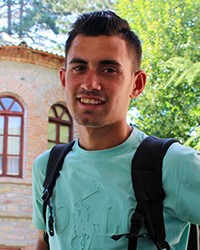Albanian in Albania

Photo Source:
Anonymous
|
Send Joshua Project a map of this people group.
|
| People Name: | Albanian |
| Country: | Albania |
| 10/40 Window: | Yes |
| Population: | 2,625,000 |
| World Population: | 5,797,000 |
| Primary Language: | Albanian, Gheg |
| Primary Religion: | Islam |
| Christian Adherents: | 33.00 % |
| Evangelicals: | 0.58 % |
| Scripture: | New Testament |
| Ministry Resources: | Yes |
| Jesus Film: | Yes |
| Audio Recordings: | Yes |
| People Cluster: | Albanian |
| Affinity Bloc: | Eurasian Peoples |
| Progress Level: |
|
Introduction / History
Albanians are probably descendants of the Illyrians, who were the original inhabitants of the western Balkan Peninsula. In the sixth century, migrating Slavs began to settle on Illyrian territory and pushed the Illyrians into what is present-day Albania.
The Albanians are divided into two major groups, the Gheg and the Tosk, according to which Albanian dialect they speak. The Gheg live north of the Shkumbin River, while the Tosk live south of the river. The two dialects differ slightly in vocabulary and pronunciation. In the 1950s it was decided that the Tosk dialect would be used in all Albanian publications since it was the one most widely spoken in Albania.
In addition to differences in dialect, the Gheg and the Tosk also have social differences. The Gheg are a very stern and courageous people; while the Tosk are known to be friendly, lively, and talkative.
The collapse of Albania's communist regime in 1991 brought on numerous traumatic and rapid changes in Albania, leaving the people with an identity crisis. The people, who had been held in darkness about the outside world, were shocked to discover that they were among the poorest in Europe. Hurt, angry, and confused, they are working their way out of poverty. By the mid 2020s Albania was the fifth poorest country in Europe, but their economy has been improving as they took charge of their own resources.
What Are Their Lives Like?
Albanians are known for their hospitality. Outsiders find food, good company and protection when they enter an Albanian village. Albanian society is divided by many fis, or clans. These clans share not only the same ancestry but also culture. Clans provide protection from other clans.
What Are Their Beliefs?
Centuries ago, many Albanians were converted to Islam by the Ottoman Turks. However, most practiced a type of "folk Islam," which embraced occult practices such as praying to the dead, seeking cures for sickness, and praying for protection from spirits and curses. Because of the hostility towards religion they experienced between 1946-1991, some Albanians remain atheistic. Some are Orthodox or Catholic.
What Are Their Needs?
The Albanians need help in improving their economy.
Prayer Points
Pray for the Holy Spirit to birth a cascading discipleship movement among the Albanians in Austria for God's glory.
Pray that Bibles will be effectively distributed to Albanians and that they will have a strong spiritual impact on the people.
Ask God to use the small number of Gheg believers to share Christ's love with their people. Pray that these believers will walk in a way worthy of the Lord, so they can draw others to him.
Pray for a movement to Christ among Albanians to spread from Western Europe back to Albania and beyond.